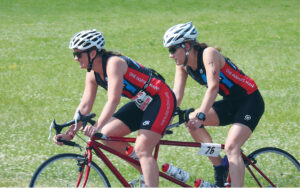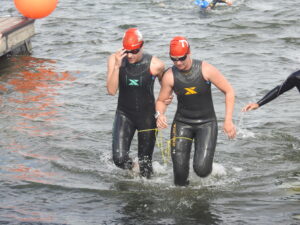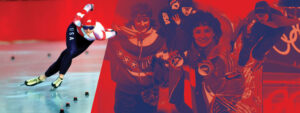
It’s all a matter of perception. Sight is something most of us take for granted, but what if it was stripped away? Would you languish or excel? What if you never had sight to begin with?
Twenty-year old Ashley Eisenmenger, the oldest of triplets born to Amy and Matt Eisenmenger of Tolono, entered the world at 27 weeks, 2 lb. 1 oz., and legally blind. Her sister Emily’s vision is good enough to drive but Kailey’s, while better than Ashley’s, is still impaired enough to prohibit driving. Ashley has no vision in her right eye and only large object perception in her left eye. It’s all she’s ever known, and she is making the most of it.
Growing up, Ashley was always very active. She played basketball in sixth grade, and in a special recreation league all through high school. She counted her steps on the floor, always knew where she was and practiced shots from the perimeter. However, during an awkward freshman transition into high school she felt like she really needed a new challenge in something that she could control, because so much of her life involved things in which she had no control. She needed something she could latch onto and that’s when she discovered her true passion – running. She ran a 5K (3.1 miles) race with a guide and found her niche.
Very competitive by nature, Ashley loved the idea of an individual sport where she could continually strive to set new personal records. “What’s really cool,” she says, “is I take an individual sport like running and make it a team sport, because I am literally tied to someone else. Even if I lost the rest of my vision today, tomorrow I could run.”
Ashley found many of her early guides through a running club to which she belongs. Now, she works closely with Delta Gamma sorority on the University of Illinois Urbana-Champaign campus where one of her first guides, Katie Donnewold, was a member. Donnewold contacted the running club to express her interest in helping a blind runner and they put her in touch with Ashley. Since then several of her guides have come from the sorority.

In the summer of 2014, Ashley was encouraged by a friend to tackle a triathlon, which consists of swimming, biking and running. The length of each leg of a triathlon varies depending on the type of race. Initially, she wasn’t sure about taking it on. The first hurdle was to find a tandem bike, because they’re not very common. Fortunately, a couple of days later, her friend called and had found one. Ashley recalls thinking: “Alright, I guess I’m doing a tri!”
A blind athlete uses a guide for the entire race. They are tethered at the waist or thigh for swimming, ride a tandem bike, and are tethered again at the waist for running. An 18-inch tether is used for running, but it’s much more involved than that. Her guide is essentially another piece of equipment that enables her to race. “When I race, it’s my race,” explains Ashley. “They are there to see that I am able to race safely and complete it as quickly as possible.”
Ashley knew how to swim but had never really done distance swimming. Her competitive spirit provided the momentum during the competition. “I did the tri, and loved it! It was one of the most fun experiences I’d ever had in racing,” she says. “It was a new challenge and exciting to find one more thing I could do with others. Typically, when people race they are alone. I’m lucky to do it tied to someone I would consider one of my best friends. So, for me, it goes further than swim, bike and run.”
In September, Ashley decided that she would do another race in the spring if she could find a tandem – the previous one was a loaner. In January 2015, her search for a tandem began, with no luck. Being a “generally impatient person” she did research because she figured she couldn’t be the only blind person that wanted to do this. She discovered there weren’t many others, but they did exist. She came across an article about Caroline Gaynor, who almost exclusively races as a guide.
Ashley found Caroline on Facebook and sent her a personal message asking if she might be able to help her find a tandem. It never crossed Ashley’s mind that Gaynor might guide her, just that she really needed that tandem bike.
Much to her surprise, Caroline responded quickly, a close friendship resulted, and they began racing together. She also introduced Ashley to an entire network of coaches, guides and other athletes. Meeting this group of different people with varying abilities has helped her slowly grow her network, which helps in her search for guides that do triathlons.

Learning to do a triathlon has been a long process for her. She had taken swimming lessons as a child, in order to learn to survive, but to say she was a swimmer was far from the truth. “I’m getting faster and learning to fine tune my stroke. If anything, the biggest challenge is being underwater. Because of the water, the other athletes can’t see, but I can’t see anyway,” she explains. “But with the waves and the water, it takes away my ability to hear. For a blind athlete, when you can’t see or hear anything, it’s tough.”
According to Ashley, “Trust is paramount. And, blind trust is putting faith in someone you might not know, which isn’t always smart. However, I have blindly trusted people to get me from point A to point B more times than I can count, and it has taken me to places I never thought I’d go. When I’m out, I have a white cane. I’m completely in control of where I go and what I do. When I’m tethered to a guide or on a tandem, it’s all on somebody else to make decisions, and I have to trust them. But, there is a reverse to that. They have to trust that when they give me a direction, I’m going to do what they say. Without trust, I can do nothing.
“Oftentimes I train with guides I’ve never met before. Caroline and I got into the pool and onto a tandem within hours of meeting each other for the first time,” she remarks. “Of course, ‘blind trust’ is a pun here because I am blind, but it’s real, too. I wouldn’t be where I am now, competing on the national level as a paratriathlete, if I hadn’t blindly trusted some random chick that I read about online.”
Through the Dare2Tri triathlon club, based out of Chicago, Ashley has had the opportunity to hone her skills. The club is for youth, adults and injured service members. The coaches and staff are trained to work with athletes with varying disabilities from beginning level all the way to those who are going to compete at the elite level. Ashley now competes as a member of the Dare2Tri Paratriathlon Development Team.
This past January, Ashley and Caroline competed in the Houston Marathon, a first for Ashley. She had two guides for that race due to the large number of participants – 24,000. The other guide cleared a path in the more congested areas, and grabbed aid or assistance at the stations along the path in order to help avoid the bottlenecks that can occur there.
Ashley doesn’t think a marathon could have gone any better. Even though it was her first, and she had nothing to compare it to, everything fell into place. She didn’t really start to feel bad until mile 21, and then it got worse by mile 23, but she feels fortunate that it was that far into the race before she “hit that wall.” Her body was really telling her to quit, but about mile 23 her friend Amanda surprised her by being at the race running alongside the course and encouraging her. And, her time qualified her to compete in the Boston Marathon next spring.
Competitive in the classroom as well, Ashley recently graduated from Parkland College in Champaign with high honors. She was asked to give the commencement address but had to turn down the offer. She had been invited to the U.S. Olympic Training Center in Colorado Springs, Colo., to the tandem cycling development camp for a week of tandem-specific training with USA Paracycling and the United States Association of Blind Athletes. She wouldn’t miss that opportunity.
Eight teams of 16 athletes attended the camp. Ashley and her pilot, Amanda Leibovitz, hadn’t ridden together before the camp. Both are triathletes, but according to Ashley, “Cycling, while a component of triathlon, requires a different skill set in racing than it does in triathlon. It immediately pushed both of us out of our comfort zones but we grew both as a team and as individuals. We found a love of track racing and time trials and learned to overcome issues with communication and bike handling.”
With the racing season in full swing, Ashley’s family doesn’t see much of her unless she is competing within driving distance. She has a large number of races scheduled including a couple of triathlons, a half-Ironman in Indiana, and nationals in California, and her goals change with the type of race. In August, she will compete in a sprint triathlon at the Paratriathlon National Championship. “My goal is to go as fast as I possibly can in every single portion of the race,” she explains, “with absolutely nothing left in the tank when I cross that finish line.”
Additionally, she will be attending North Central College in Naperville in the fall as a communications major. Ashley will be a part of the women’s varsity triathlon team. Triathlon is new to the NCAA and she will be the first blind triathlete to compete at that level. They are still working out the details, but the NCAA will allow her to have a guide that is not a student of the college.
What does the future hold? The triathlon is debuting at the games in Rio De Janeiro this summer. Ashley would like to see how she would stack up on a world stage and sees herself competing for the U.S. in the 2020 Paralympic Games in Tokyo, Japan.
Ashley has always been very upfront about her feelings in dealing with her lack of vision. She says, though, that if given her vision tomorrow, she wouldn’t take it.
“I feel like you’re dealt a certain hand in life and I’m making the most of what I’ve got. Honestly, at this point, I can’t imagine seeing what you see,” she explains. “I think it’s great, because I need others to be my eyes, but I’m doing just fine without much vision. A lot of people think there’s things I’m missing out on, but because of who I am, I’m headed to the Olympic Training Center! So, no, I wouldn’t take it. I’ve taken what I’ve got and run with it – literally!
Blind trust
What does it take to be a guide? Communication is key. Ashley’s guides need to be faster runners than she is, so they can be comfortable with the pace she is setting and put their focus on being her eyes. Uneven pavement, potholes, sticks and low-hanging branches are all things she can’t see. Her safety depends on them clearly communicating in terms she can understand. Another trait she looks for is personality compatibility. “I’m literally tied to someone for an hour or more, depending on the kind of race I’m doing. There is a very emotional connection I form with my guides. When you are working with a guide, you are feeding off of, and need to be able to work with, each other.
“A guide also has to be verbal,” says Ashley. “She is acting as my eyes and has to tell me to go left, go right, and take sharp or gradual turns. She can’t tell me to watch out for the pothole because I’m never going to see it. The directions need to be direct and concise. It’s funny sometimes because they will say, ‘did you see that?’ Of course I didn’t and I just have to laugh!”
Before a race, Ashley prepares herself mentally and checks her gear. One of the most important components of her preparation is talking with her guide and going through the race plan together. There is a lot of verbal communication, but she “sees” through touch. Her guides can use her hand to draw out the course for her.
From a guide’s perspective
“Ashley is an absolute pleasure to guide,” says Caroline Gaynor. “She is such a hard-working, up-for-anything kind of person and I found that I connected with her immediately. I have no doubt Ashley will conquer any goal she sets for herself. She is also an outstanding partner and always works with me, gives me feedback and listens to the feedback I give her. We make a great team.”
Caroline’s number one concern is always her athlete’s safety. “I am completely focused on making sure they are able to have the best possible race experience,” she says. “When I’m guiding, the race isn’t about me; I want to allow the athlete to run her own race.”
Before any event, Caroline has a discussion with the athlete about what pace they usually swim/bike/run when they are training, and what goals they want to accomplish. She says that “ideally, I should be able to maintain my athlete’s fastest pace even on my worst day. Though, it’s helpful to race with someone who is understanding if a bad day does happen.”









